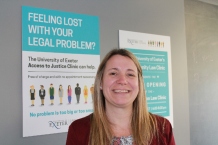
Tia Matt, Senior Lecturer, Director of Clinical Legal Education
My unconventional pathway to success
Senior Lecturer, Director of Clinical Legal Education Tia Matt shares how she has enjoyed creating and choosing her own pathway, including establishing a flourishing pro bono clinic programme at the university.
The day that I turned 18, I broke tradition. Although not a sought out tradition, a tradition nonetheless, in my family, was to have a baby by the time you were 18 and to quit high school. Not only did I not have a baby, I decided to finish high school, and go to university. In the United States, law school is a 3 year graduate degree, so I first got my bachelor’s in Criminal Justice and then went to law school to receive my Doctor of Jurisprudence. During law school, I got married and decided it was easier to have a child while in school with the flexibility of class choice and schedule versus the inflexibility of the law office at a big firm. After having my daughter in my third year, I realised that I never wanted to leave her for very long, so instead of doing what all of my classmates did, which was to go work at big firms, I started my own practice right after graduation. Being my own boss meant I could take clients as it suited me and my schedule. It meant more time with my daughter. I created a successful asset protection practice.
I do still practice from time to time. My practice focuses on Estate and Business planning with an emphasis in Asset Protection.
I started working at the university in 2014. One thing that struck me was that students were not getting the practical experience that I had as a student. At the time, not many universities were running practical programmes. After a bit of convincing of the university that this would work, my colleague, Luke Price and I, started a pro bono programme. What began as 70 students in 2016 has grown to 450 students currently participating in pro bono. There are a wide range of projects and clinics available for students to participate in across family, criminal, and civil law.
In 2017, we began the Community Law Clinic which is made up of eight distinct law clinics. Its mission is to give free legal information and advice to help reduce the gap in legal services created by the legal aid cuts. The clinics are supervised by practitioners in each of the specialised areas and allows students to interview clients and provide legal advice. The clinic operates as a law office, thus giving students the much needed practical experience. In 2018, I completed the Qualifying Lawyer Transfer Scheme (QLTS) and became a solicitor of England and Wales, which allows me to do the direct supervision in the clinic.
Of the 1300 students in the Law School around 35% across the years commit to do pro bono work, with an average student committing to about 4 hours per month. Through these efforts the students become more experienced and more employable, while at the same time providing an invaluable service to the community.
Throughout my life, I have enjoyed creating and choosing paths which were not made for me, but made by me. I hope to continue this path by growing and expanding the great work of my students and establishing the University of Exeter as a vital member of the legal community.
You can read more about the successes of the clinic here.
Date: 28 February 2019
